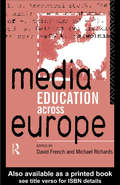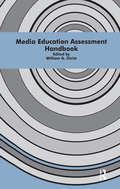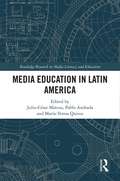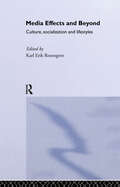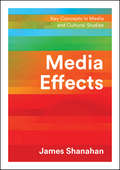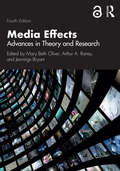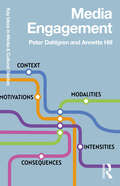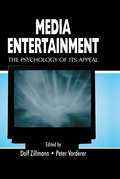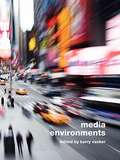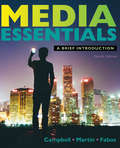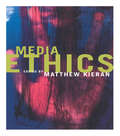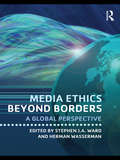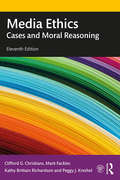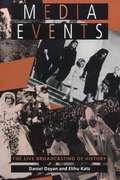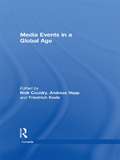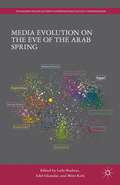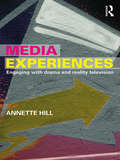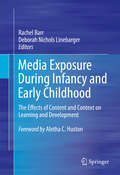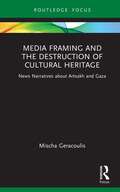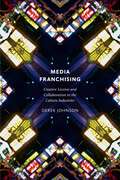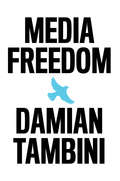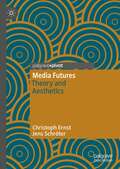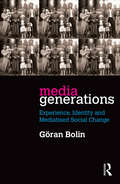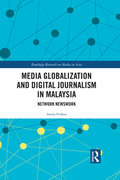- Table View
- List View
Media Education Across Europe
by David French Michael RichardsEducation in and about the media is expanding across Europe and, like the industries it studies, is changing rapidly. The future of media education is a matter of live concern in all European countries, as educators and practitioners throughout the continent come together to learn from each other and to plan for the changes to come. Media Education Across Europe identifies the exciting developments now taking place within and across the boundaries of European nation-states. Essays from eight countries - the U.K., France, Germany, Italy, Spain, Belgium, Sweden and the Netherlands - explore the development of courses and approaches to the subject in each country. The contributors also consider the prospects for European collaboration in media education; the possibilities opening up for graduate employment and the future conflict - and co-operation - between media teachers and media employers.
Media Education Assessment Handbook: A Resource Handbook For Educators And Administrators: Component 3: Developing An Assessment Plan (Routledge Communication Series)
by William G. ChristAssessing media education is a formidable task because both assessment and media education are complex and controversial concepts. Assessment, which can take place at the individual student, class, sequence, program, department or unit, and university levels, is questioned in terms of reliability, validity, relevance, and cost. Media education, which has been challenged at a number of schools, finds faculty and administrators in the midst of soul-searching about how to clearly articulate its missions and purposes to a broader audience. Departments are under increasing national, state, and institutional pressure to get assessment procedures carried out quickly, but there is an obvious danger in rushing to implement assessment strategies before establishing what is essential in media education. In communication education in general, the "what" of assessment is often discussed in terms of skills, attitudes, affect, values, and knowledge. People assess students to determine what they know, think, feel, value, and can do. Here it is suggested that one of the places to start defining what students should learn from their media education is by identifying outcomes. Outcomes can be assessed in a variety of ways, but first they need to be developed and clearly articulated.
Media Education in Latin America (Routledge Research in Media Literacy and Education)
by Julio-César Mateus Pablo Andrada María-Teresa QuirozThis book offers a systematic study of media education in Latin America. As spending on technological infrastructure in the region increases exponentially for educational purposes, and with national curriculums beginning to implement media related skills, this book makes a timely contribution to new debates surrounding the significance of media literacy as a citizen’s right. Taking both a topical and country-based approach, authors from across Latin America present a comprehensive perspective of the region and address issues such as the political and social contexts in which media education is based, the current state of educational policies with respect to media, organizations and experiences that promote media education.
Media Effects and Beyond: Culture, Socialization and Lifestyles (Communication and Society)
by Karl Erik RosengrenAddressing a multitude of questions and issues surrounding how we use the media, Media Effects and Beyond represents the results of an international research programme into the use and effects of television, video and music. Seeing the viewer not simply as passive object but as a very active subject, the contributors engage with every aspect of children's, adolescents' and families' use of the media - its character, causes and consequences. Topics explored include media and social mobility; family commumication, and consumer lifestyles. Confronting the two traditions of lifestyle research and effects research, Media Effects and Beyond offers a much-needed reconceptualization of both. Written at a time when traditional European public service media systems struggle against a tidal wave of commercial electronic media, this book will be important reading for students of contemporary culture and communications, as well as media policy for decision makers.
Media Effects: A Narrative Perspective (Key Concepts in Media and Cultural Studies)
by James ShanahanDoes exposure to media violence make us more violent? Do stereotypes in the media affect the way we see different social groups? Do media institutions play any role in social change? Media Effects is a concise introduction which studies the ways in which media use affects society. James Shanahan explores how researchers and society became interested in media effects, outlines the important developments in the field, and looks at how research on narrative is playing a progressively important role in revealing what we know. The book also provides a timely interweaving of different perspectives, ranging from concerned and critical voices within media studies to quantitative psychological approaches which tend to be more sceptical about powerful media effects. Concise and authoritative, Media Effects is the go-to text for students and scholars getting to grips with this fascinating and important topic.
Media Effects: Advances in Theory and Research (Routledge Communication Series)
by Jennings Bryant Mary Beth Oliver Arthur A. RaneyNow in its fourth edition, Media Effects again features essays from some of the finest scholars in the field and serves as a comprehensive reference volume for scholars, teachers, and students. This edition contains both new and updated content that reflects our media-saturated environments, including chapters on social media, video games, mobile communication, and virtual technologies. In recognition of the multitude of research trajectories within media effects, this edition also includes new chapters on narratives, positive media, the self and identity, media selection, and cross-cultural media effects. As scholarship in media effects continues to evolve and expand, Media Effects serves as a benchmark of theory and research for the current and future generations of scholars. The book is ideal for scholars and for undergraduate and graduate courses in media effects, media psychology, media theory, psychology, sociology, political science, and related disciplines.
Media Engagement (Key Ideas in Media & Cultural Studies)
by Annette Hill Peter DahlgrenWritten with media students in mind, this accessible book provides both students and researchers with a new perspective on how to research engagement, not as a metric but as a marker of power relations. This book navigates the reader through a tighter analytical notion of engagement within an understanding of media, culture and democracy. Dahlgren and Hill offer a new definition of engagement as an energising internal force, and as such a powerful means to further human agency. From this definition, the book builds a generative theory of engagement as a nexus of relations we make and break with media on a daily basis, with examples from political activism, news and disinformation, and the global pandemic. Dahlgren and Hill identify five parameters of engagement in order to understand the relations we have with media across changing public and mediated spheres. This new perspective offers students and researchers pathways for investigating the meaning of media engagement as a resource for living. It will be particularly useful for undergraduate courses on media audiences and publics, political communication and democracy, media and cultural theory, journalism, and for media, communication and sociology studies more broadly.
Media Entertainment: The Psychology of Its Appeal (Routledge Communication Series)
by Peter Vorderer Dolf ZillmannThis collection represents a systematic exploration of media entertainment from an academic perspective. Editors Zillmann and Vorderer have assembled scholars from psychology, sociology, and communication to provide a broad examination of the primary function of media entertainment--the attainment of gratification. Chapters included here address vital aspects of media entertainment and summarize pertinent findings, providing an overview of what is presently known about the appeal and function of the essential forms of media entertainment, and offering some degree of integration. Written in a clear, non-technical style, this volume provides a lively and entertaining study of media entertainment for academic study and coursework.
Media Environments
by Barry VackerMedia Environments is based on a simple concept: combine movies with texts to critique media and society in the 21st century. That's right, movies and texts. But this is not edutainment! This anthology uses popular film as a gateway to critical readings, culled from the works of a variety of well-known thinkers, scholars, and writers. Authors include Stephen Hawking, Al Gore, Naomi Klein, Carl Sagan, Naomi Wolf, Susan Jacoby, Neil Postman, Henry Jenkins, Neil deGrasse Tyson, Ray Kurzweil, and many others. Their writings are introduced to students through films like The Social Network, Contact, Network, American Beauty, Fight Club, The Truman Show, Slumdog Millionaire, Waking Life,WALL. E, Good Night, and Good Luck, and many others.
Media Essentials: A Brief Introduction
by Richard Campbell Bettina Fabos Christopher R. MartinMedia Essentials focuses on the pivotal aspects of mass communication, helping students better understand what the media is and the impact of the most vital recent changes on the mass-media landscape. The new Media Essentials features an array of Digital Turn and Media Literacy boxes with specific, detailed case studies providing windows to broader ideas about the media, and a robust program of LaunchPad videos and Web clips that drive home the book's approach to media literacy, convergence, and analysis. In its fourth edition, this more concise and more affordable option for mass communication courses is more current, flexible, and informative than ever.
Media Ethics
by Matthew KieranMedia Ethics brings together philosophers, academics and media professionals to debate pressing ethical and moral questions for journalists and the media and to examine basic notions such as truth, virtue, privacy, rights, offence, harm and freedom which are used in answering them.
Media Ethics Beyond Borders: A Global Perspective
by Stephen J.A. WardThis volume explores the construction of an ethics for news media that is global in reach and impact. Essays by international media ethicists provide leading theoretical perspectives on major issues and applies the ideas to specific countries, contexts and problems, addressing such questions as: Are there universal values in journalism? How would a global media ethics do justice to the cultural, political, and economic differences around the world? Can a global ethic based on universal principles allow for diversity of media systems and cultural values? What should be the principles and norms of practice of global media ethics? The result is a rich source of ethical thought and analysis on questions raised by contemporary global media.
Media Ethics: Cases and Moral Reasoning
by Mark Fackler Clifford G. Christians Kathy Brittain Richardson Peggy KreshelMedia Ethics: Cases and Moral Reasoning challenges readers to think analytically about ethical situations in mass communication through original case studies and commentaries about real-life media experiences. This text provides a comprehensive introduction to the theoretical principles of ethical philosophies, facilitating ethical awareness. It introduces the Potter Box, with its four dimensions of moral analysis, to provide a framework for exploring the steps in moral reasoning and analyzing the cases. Focusing on a wide spectrum of ethical issues faced by media practitioners, the cases in this Eleventh Edition include the most recent issues in journalism, broadcasting, advertising, public relations and entertainment. Cases touch on issues and places worldwide, from Al Jazeera to the Xinhua News Agency, from Nigerian "brown envelopes" to PR professional standards in South Africa. Racially divisive language comes up in different communication contexts, as does celebrity influence on culture. A core textbook for classes in media ethics, communication ethics, and ethics in journalism, public relations, and advertising. The companion website [url] contains sample syllabi and lesson plans, PowerPoint presentations, discussion and test questions, and a library of video and other media materials for class use.
Media Events
by Daniel DayanAn ethnography of how such media events as the Olympic Games, the moon landing, Kennedy's funeral, and the royal wedding, are scripted, negotiated, performed, celebrated, shamanized, and reviewed. Drawing from the theories of Max Weber and Emile Durkheim, shows how television can declare holidays and create history.
Media Events in a Global Age (Comedia)
by Andreas Hepp Nick Couldry Friedrich Krotz"This volume assembles an estimable range of critical analyses of one of the most important mediated artifacts of the modern world—the media event. The authors challenge the construct, extend its usefulness, expand its theoretical basis and application, and examine media events in a far larger and richer context than ever before. Students of global media today are well served by this superb collection of essays."David Morgan, Duke University, USA "A welcome and worthy successor to Dayan and Katz’s path-breaking study that expands and enriches the discourse on global media events." Daya Thussu, University of Westminster, UK "This is an excellent collection, that will enable new kinds of argument about, and hopefully research into, the spectacular functions of the contemporary media." Graeme Turner, University of Queensland, Australia We live in an age where the media is intensely global and profoundly changed by digitalization. Not only do many media events have audiences who access them online, but additionally digital media flows are generating new ways in which media events can emerge. In times of increasingly differentiated media technologies and fragmented media landscapes, the ‘eventization’ of the media is increasingly important for the marketing and everyday appreciation of popular media texts. The events covered include Celebrity Big Brother, 9/11, the Iraq war and World Youth Day 2005 to give readers an understanding of the major debates in this increasingly high-profile area of media and cultural research.
Media Events: A Critical Contemporary Approach
by Bianca Mitu Stamatis PoulakidakosMedia Events: A Critical Contemporary Approach proposes an interdisciplinary and multicultural approach of Dayan and Katz's theory of media events (1992) by applying it to contemporary situations. The contributing authors come from a range of countries (UK, USA, Mexico, Germany, Finland, Italy, Greece, Portugal, Ukraine) and analyse the theory of media events from different perspectives, incorporating social media and offering a re-positioning of Dayan and Katz's theory of media events. By bringing new perspectives into this field, the proposed volume is an important contribution as it grounds the intervention and rethinking of the theory into further empirical research. This volume has the potential to function as a 'cross-generational' link between one of the 'early classics' of media and communication studies on the one hand and the present generation of researchers on the other.
Media Evolution On The Eve Of The Arab Spring
by Mimi Kirk Adel Iskandar Leila HudsonMedia Evolution on the Eve of the Arab Spring brings together some of the most celebrated and respected names in Arab media research to reflect on the communication conditions that preceded and made the Arab uprisings possible.
Media Experiences: Engaging with Drama and Reality Television
by Annette HillMedia Experiences: Engaging with Drama and Reality Television travels across people and popular culture, exploring the pathways to engagement and the various ways in which we shape and are shaped by the media landscapes in which we move. This exploration includes the voices and bodies, sights and sounds of audiences as they experience entertainment through television drama, reality TV, at live events, and within digital television itself as actors, participants and producers. It is about the people who create the drama, live events and reality entertainment that we experience. This book traverses the relationships between producers and audiences in shared places of a media imagination. Annette Hill’s research draws on interviews and observations with over 500 producers and audience members to explore cultures of viewing across different genres, such as Nordic noir crime drama The Bridge, cult conspiracy thriller Utopia, and reality television audiences and participants in global formats MasterChef and Got to Dance. The research highlights how trends such as multi-screening, catch up viewing, amateur media and piracy work alongside counter-trends in retro television viewing where people relish the social ritual of watching live television, or create a social media blackout for immersive viewing. Media Experiences bridges the divide between industry and academia, highlighting how producers and audiences co-create, shape and limit experiences within emerging mediascapes.
Media Exposure During Infancy and Early Childhood
by Rachel Barr Deborah Nichols LinebargerThis book discusses the burgeoning world of young children's exposure to educational media and its myriad implications for research, theory, practice, and policy. Experts across academic disciplines and the media fill knowledge gaps and address concerns regarding apps, eBooks, and other screen-based technologies--which are being used by younger and younger children--and content delivery and design. Current research shows the developmental nuances of the child as learner in home, school, and mobile contexts, and the changes as parenting and pedagogy accommodate the complexities of the new interactive world. The book also covers methods for evaluating the quality of new media and prosocial digital innovations such as video support for separated families and specialized apps for at-risk toddlers. Highlights of the coverage: The role of content and context on learning and development from mobile media. Learning from TV and touchscreens during early childhood Educational preschool programming. How producers craft engaging characters to drive content delivery. The parental media mediation context of young children's media use. Supporting children to find their own agency in learning. Media Exposure During Infancy and Early Childhood is an essential resource for researchers, clinicians and related professionals, and graduate students in diverse fields including infancy and early childhood development, child and school psychology, social work, pediatrics, and educational psychology.
Media Framing and the Destruction of Cultural Heritage: News Narratives about Artsakh and Gaza (Routledge Focus on Media and Humanitarian Action)
by Mischa GeracoulisAnalyzing media coverage in cases where cultural heritage sites have been destroyed during conflict, occupation, and war, this book highlights the important role media play in the preservation of cultural heritage when states or other combatants engage in human rights violations.Author Mischa Geracoulis discusses how the role of journalism and the media during times of conflict is to report information from the front lines and war zones with integrity, and report accurately when states or other combatants engage in human rights violations. This book examines the media coverage, language, and discourse surrounding two key situations—the destruction of Armenian cultural heritage in Artsakh/Nagorno‑Karabakh and that of Palestinian cultural heritage in Gaza—and explores the ways media coverage has succeeded or failed in accurately illustrating the destruction of cultural heritage as a human rights violation. Geracoulis emphasizes the importance of factual, ethical reporting and sufficient coverage, underlining professional journalistic standards and best practices for the future to ensure similar destruction is not only understood but responded to within a human rights framework.This book will be of interest to students and scholars of media, journalism, and cultural studies, as well as media professionals interested in the role and influence of media framing and narratives on war, conflict, human rights, and humanitarian response.
Media Franchising: Creative License and Collaboration in the Culture Industries (Postmillennial Pop #11)
by Derek Johnson"Johnson astutely reveals that franchises are not Borg-like assimilation machines, but, rather, complicated ecosystems within which creative workers strive to create compelling 'shared worlds.' This finely researched, breakthrough book is a must-read for anyone seeking a sophisticated understanding of the contemporary media industry."—Heather Hendershot, author of What's Fair on the Air?: Cold War Right-Wing Broadcasting and the Public InterestWhile immediately recognizable throughout the U.S. and many other countries, media mainstays like X-Men, Star Trek, and Transformers achieved such familiarity through constant reincarnation. In each case, the initial success of a single product led to a long-term embrace of media franchising—a dynamic process in which media workers from different industrial positions shared in and reproduced familiar cultureacross television, film, comics, games, and merchandising.In Media Franchising, Derek Johnson examines the corporate culture behind these production practices, as well as the collaborative and creative efforts involved in conceiving, sustaining, and sharing intellectual properties in media work worlds. Challenging connotations of homogeneity, Johnson shows how the cultural and industrial logic of franchising has encouraged media industries to reimagine creativity as an opportunity for exchange among producers, licensees, and evenconsumers. Drawing on case studies and interviews with media producers, he reveals the meaningful identities, cultural hierarchies, and struggles for distinction that accompany collaboration within these production networks.Media Franchising provides a nuanced portrait of the collaborative cultural production embedded in both the mediaindustries and our own daily lives.
Media Freedom
by Damian TambiniThe contentious role of social media in recent elections and referendums has brought to the fore once again the fundamental question of media freedom and the extent to which, and the way in which, the media should be regulated in a modern democratic society. This book surveys the history of media in the US, the UK and Europe in order to develop a new theory of media freedom that is capable of resolving current controversies about how best to regulate the media, including the internet and social media. Tambini argues that democratic regulation of the media must build upon – and learn from – the long history of accommodation between the press, broadcasting, the state and corporate power. By attending to this history, we can see that media freedom is not absolute but rather conditional, taking the form of a social contract of privileges and connected duties. Tambini develops this social contract account of media freedom and applies it to different media sectors, from the press and broadcasting to the internet and social media. Above all, he argues for a renewed role for international human rights law standards in media governance, and an end to American exceptionalism. Written for students, scholars, policymakers and media professionals, this wide-ranging book will be of interest to everyone concerned about the role of the media in our societies and about the health of our democracies.
Media Futures: Theory and Aesthetics
by Jens Schröter Christoph ErnstThis book deals with the connection between media and the future. It is about the imagination of futuristic media and what this says about the present, but it also shows how media are imagined as means to control the future. The book begins by describing different theories of the evolution of media and by exploring how this evolution is tied to expectations regarding the future. The authors discuss the theories of imagination and how the imagination of media futures operates. To do so, they analyse four concrete examples: the imaginations once related to interactive television and how they were performed in an important piece of media art; those on “ubiquitous computing,” which remain present today; those on three-dimensional, especially holographic, displays that are prevalent everywhere in cinema, and lastly the contemporary imaginations on quantum computing and how they have been enacted in science fiction. The book appeals to readers interested in the question of how our present imagines its technological futures.
Media Generations: Experience, identity and mediatised social change
by Goran BolinWhile the analysis of generations has been central in the sociological understanding of social change, the role of the media in this process has only been acknowledged as an important feature during the last couple of decades. Building on quantitative and qualitative comparative research, Media Generations analyses the role of the media in the formation of generational experience, identity and habitus, and how mediated nostalgia is an important part in the social formation of generations. <P><P>Avoiding popular generational labelling Göran Bolin argues that the totality of the media landscape is a contextual structure that together with age and life-course factors help inform world-views and ways to relate to the wider society that guide the actions of media users. Media Generations demonstrates how - as different generations come of age at different moments in the mediatised historical process - they develop different media habits, but also make sense of the world differently, which informs their relations to older and younger generations. <P><P>It also explores how this process of ‘generationing’, that is, the process in which a generation come into being as a self-perceived social identity, partly builds on specific kinds of nostalgia that establishes generational differences and distinctions. This book will be of special interest to those studying social change, collective memory, cultural identity and the role of the media in social experience.
Media Globalization and Digital Journalism in Malaysia: Network Newswork (Routledge Research on Media in Asia)
by Amira FirdausThe media ecology within which conventional mainstream journalism currently operates has undergone major transformations since the advent of social media. These transformations arise from the disruption brought upon by the emergence of networked, interactive platforms and user-driven online applications including social media, blogs and alternative citizen news sites. This book analyses networked forms of journalistic production at traditional news organizations and their conventional news channels. Focusing on case studies from Malaysia, it examines current transformations to the norms, practices and values of conventional news production. Drawing upon a recent global-comparative turn in journalism studies and parallel efforts to de-Westernize communication theory, this book suggests an innovative ‘glocal’ comparative approach to analyse ‘network newswork’ among global, transnational, and local news organizations, including Al Jazeera and Bernama TV, located within the same geographical locality, Kuala Lumpur, Malaysia. This author uses an empirically-grounded conceptual framework for exploring and understanding recent transformations that user-driven networked resources bring to professional journalists’ daily work of producing news. Discussing the implications of network newswork on the wider global journalistic sphere, the book elucidates a tiered model of networked sources and expounds upon journalism’s deepening of the digital divide in its inadvertent muting of the voices of non-networked communities that are switched off from the global news sphere and its network society. A fresh perspective on the analysis of globalization in the media and a useful guide for gaining access into media organizations and securing cooperation of organizational members for research, this book will be of interest to researchers in the field of Asian Media and Communication Studies, Journalism Studies, Political Communication and Sociology of Journalism.
